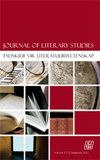Apartheid’s Patriarchies in Decline: White Masculinities in Damon Galgut’s The Promise
IF 0.1
4区 文学
0 LITERARY THEORY & CRITICISM
引用次数: 0
Abstract
The initial popular reception of Damon Galgut’s The Promise (2021) has overlooked issues of gender in the text, favouring instead the more narrow allegorical readings of race. In response to this, this article emphasises the novel’s engagement with the distinctly gendered nature of the transition from apartheid, focusing on the representation of white masculinities in the text. This article raises concerns about how these masculinities are depicted. Through close engagement with the text’s systematic introduction and disavowal of the constitutive forces of apartheid’s patriarchies—including fatherhood, Christianity, and the security state—this article argues that the novel’s engagement with white masculinities is one of negation; it offers a narrative mode in which white masculinities are rendered sterile, rewritten in the well-worn register of an anti-apartheid moral certitude that depends on tired tropes. While the novel attempts an important decentring of white masculinities, its outlook is ultimately bleak as white masculinities are shown to lack depth, resulting in their power in the present being curiously absented in an act of textual erasure.种族隔离的父权制在衰落:达蒙·高古特《无极》中的白人男子气概
达蒙·高古特的《无极》(2021)最初受到的欢迎忽略了文本中的性别问题,而倾向于对种族进行更狭隘的寓言解读。针对这一点,本文强调了小说对从种族隔离过渡的明显性别性质的参与,重点关注白人男性气质在文本中的表现。这篇文章引起了人们对如何描绘这些男子气概的关注。通过对文本的系统介绍和对种族隔离父权制的构成力量的否定——包括父权、基督教和安全国家——的密切关注,本文认为小说对白人男性的参与是一种否定;它提供了一种叙事模式,在这种模式下,白人男子气概被渲染得毫无生机,用一种陈旧的、依赖于陈腐比喻的反种族隔离道德确定性来重写。虽然小说试图对白人男子气概进行重要的去中心化,但它的前景最终是黯淡的,因为白人男子气概被显示出缺乏深度,导致他们在当前的力量在文本删除行为中奇怪地消失了。
本文章由计算机程序翻译,如有差异,请以英文原文为准。
求助全文
约1分钟内获得全文
求助全文
来源期刊

Journal of Literary Studies
Multiple-
CiteScore
0.50
自引率
0.00%
发文量
0
期刊介绍:
The Journal of Literary Studies publishes and globally disseminates original and cutting-edge research informed by Literary and Cultural Theory. The Journal is an independent quarterly publication owned and published by the South African Literary Society in partnership with Unisa Press and Taylor & Francis. It is housed and produced in the division Theory of Literature at the University of South Africa and is accredited and subsidised by the South African Department of Higher Education and Training. The aim of the journal is to publish articles and full-length review essays informed by Literary Theory in the General Literary Theory subject area and mostly covering Formalism, New Criticism, Semiotics, Structuralism, Marxism, Poststructuralism, Psychoanalysis, Gender studies, New Historicism, Ecocriticism, Animal Studies, Reception Theory, Comparative Literature, Narrative Theory, Drama Theory, Poetry Theory, and Biography and Autobiography.
 求助内容:
求助内容: 应助结果提醒方式:
应助结果提醒方式:


